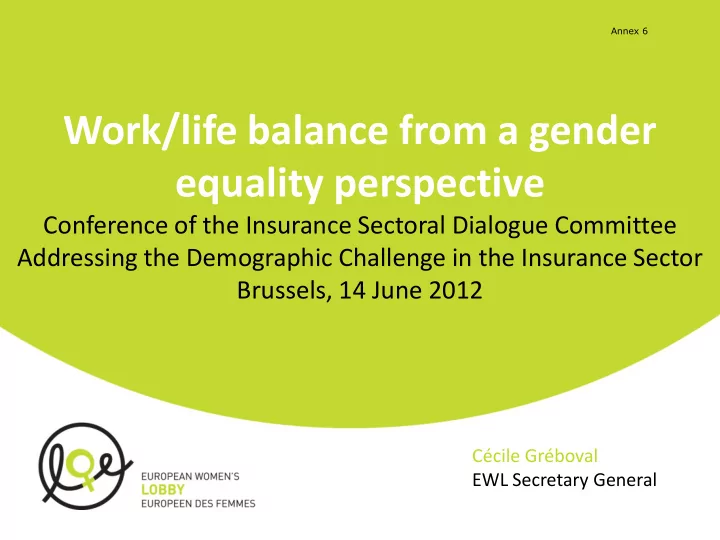

Annex 6 Work/life balance from a gender equality perspective Conference of the Insurance Sectoral Dialogue Committee Addressing the Demographic Challenge in the Insurance Sector Brussels, 14 June 2012 Cécile Gréboval EWL Secretary General
Annex 6 The voice of European Women The largest umbrella organisation of women’s associations in the EU National co ordinations in 30 European countries and 20 European-wide member organisations Aiming to promote women’s rights and gender equality primarily at EU level Working on a broad spectrum of areas: women in decision-making, violence against women, employment etc.
Annex 6 WORK-LIFE BALANCE What are we talking about? ‘Work– life balance is about people having a measure of control over when, where and how they work. It is achieved when an individual’s right to a fulfilled life inside and outside paid work is accepted and respected as the norm, to the mutual benefit of the individual, business and society .’ ( The Work Foundation )
Annex 6 WORK-LIFE BALANCE Existing Gender Inequalities & Challenges Lack of ‘Domestic Democracy’: women shoulder a disproportionate share of unpaid care and household work Outdated patriarchal work patterns : in particular long and rigid work hour demands, late night meetings etc. Lack of child/ elederly care services : impacts more on women more than on men Direct impact on women’s employment situation: gender pay and pension gap and unequal career advancement
Annex 6 WORK- LIFE BALANCE AND WOMEN’S ECONOMIC INDEPENDENCE IN A LIFE CYCLE PERSPECTIVE
WORK-LIFE BALANCE Annex 6 The Business Case Studies show that work-life balance is good business for employers, but also for companies and society as a whole. Enhanced work life balance: Increases competitiveness Is cost saving Increases productivity Women now make up almost half of the work force and companies cannot afford to keep work systems that do not match this reality Is a prerequisite for equality between women and men in employment
Annex 6 REAL WORK LIFE BALANCE MEANS RECOGNISING THE HUMAN LIFE CYCLE Equal sharing of unpaid work and responsibilities between women and men at home Adapted , flexible work patterns - taking into account small children/elderly care responsibilities for both men and women as part of any worker’s work -life cycle Change of work place and board room culture: long hours culture, ‘boy’s club’ environment hampering women’s advancement /reconciliation with family life Modern care economy providing quality care infrastructure and leave arrangements
Annex 6 EWL RECOMMENDATIONS FOR EU POLICIES Adoption of revised Maternity/Paternity directive Fulfill and strengthen EU Barcelona Targets (child care services) Adopt provisions on care leave (care leave for dependents) Establish binding EU targets to reduce Gender Pay and Pension Gaps Encourage modernisation of the ‘Care Economy ’ : - Acknowledge social and economic value of care - Investment in care infrastructure = investment in flexible workforce, future generations and society at large
Annex 6 EWL RECOMMENDATIONS FOR EU POLICIES Monitor and counteract the impact of the crisis on gender equality. Contrary to previous crisis, women are staying in the job market but the crisis has a negative impact: less public funding for care services reluctance to improve leave arrangements discrimination, including in relation to rights related to maternity leave Risk of backlash in relation to previous advances and loss of GDP .
Annex 6 THANK YOU FOR YOUR ATTENTION! Information: www.womenlobby.org
Recommend
More recommend